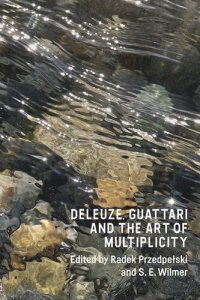
Ebook: Deleuze, Guattari and the Art of Multiplicity
Author: Radek Przedpełski, S. E. Wilmer
- Year: 2022
- Publisher: Edinburgh University Press
- Language: English
- pdf
Explores the concept of multiplicity in Deleuze and Guattari’s work and its relevance to artistic practice
- Provides a series of philosophical encounters with the concept of multiplicity
- Points to the potentialities circulating in various media for social change
- Decolonialises our thinking about art by bypassing the mediation of the traditional western-centred art history
- Contributors include Mieke Bal, James Williams, Laura Marks, Gary Genosko and Eugene Holland
This collection of essays from a range of philosophers and art practitioners offers tools through which we can action change across art and philosophy, across a range of media and across the theory/practice divide.
Including insights from digital apps to Indigenous ritual art and from feminist and queer art to refugee performances and talismanic magic associated with Islamic Neoplatonism, this collection will decolonise your thinking about art – subverting the traditional Western-centred art history.
The first section includes theoretical essays on the concept of multiplicities, on affect and politics as well as the thought of Raymond Ruyer and Gilbert Simondon – 2 key influences on Deleuze and Guattari.
The second section includes applied essays on specific art practices including the plastic arts, theatre, architecture, music and folk performances.
Notes on Contributors
Mieke Bal, cultural theorist, critic, video artist and occasional curator.Burcu Baykan, Bilkent University, Turkey.Gary Genosko, University of Ontario, Institute of Technology in Toronto, Canada.Barbara Glowczewski, National Scientific Research Center, Collège de France, EHESS, France.Eugene W. Holland, Ohio State University, USA.Adi Louria Hayon, Tel Aviv University, Israel.Laura U. Marks, Simon Fraser University, Canada.Radek Przedpełski, Trinity College, Dublin, Ireland.Daniela Voss, University of Hildesheim, Germany.James Williams, Deakin University, Australia.S. E. Wilmer, Trinity College, Dublin, Ireland.Audronė Žukauskaitė, Lithuanian Culture Research Institute, Lithuania.